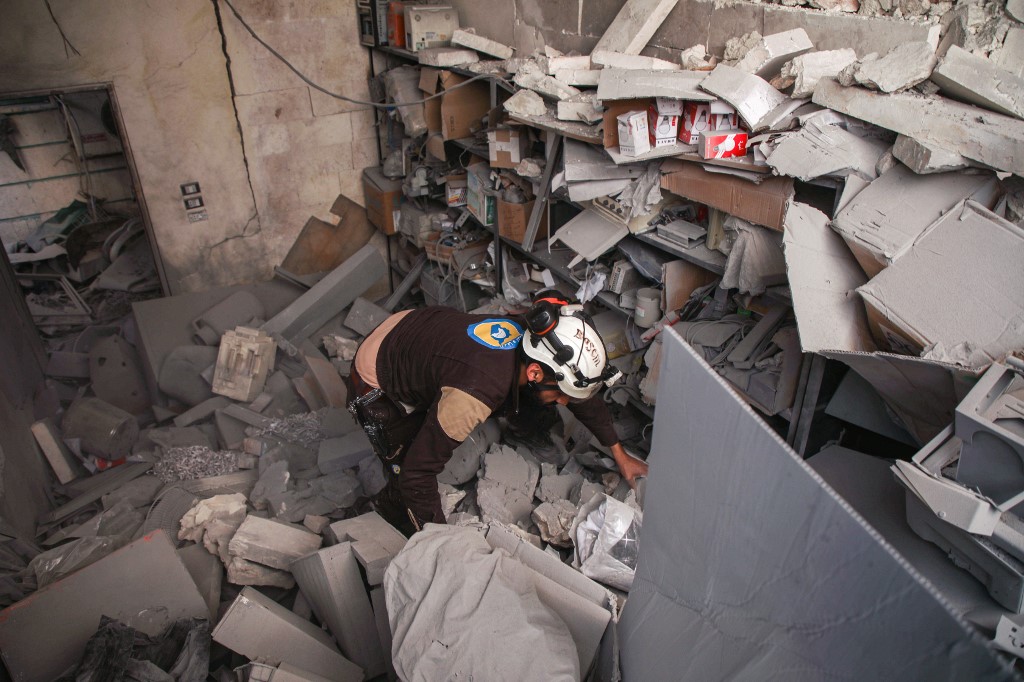Caesar Act sanctions are crippling Syria's beleaguered health sector
Many hospitals need urgent reconstruction, but sanctions are preventing them from importing critical equipment

An injured Syrian child receives treatment at a hospital in Idlib province in November 2019 (AFP)
 It has been a month since US Secretary of State Mike Pompeo announced Caesar Act sanctions coming into play as policy on 17 June.
It has been a month since US Secretary of State Mike Pompeo announced Caesar Act sanctions coming into play as policy on 17 June.
There has been a clear mismatch in US priorities, as seen by the differences between Pompeo and US President Donald Trump referenced by former UN ambassador John Bolton in his new book; Trump was more interested in hostages than in what Pompeo or Bolton had to say about Syria. But whatever the politics behind the Caesar Act, it is hurting ordinary Syrians already suffering amid the collapse of Lebanon’s economy. Healthcare stands as the best example of this.
Political and financial crisis
Far before the enactment of the Caesar Act, Syria’s economy had collapsed from already austere sanctions, combined with a war economy that has dramatically worsened living conditions for ordinary Syrians. Syrians are suffering from ailments beyond the immediate scope of the war, including cancer, diabetes and the resurgence of once-eradicated diseases like polio which made a comeback in 2015 but now gone again.
The current situation is terrible, even worse than the expected aftermath of nine years of fighting. It has been exacerbated by the political and financial crisis in neighbouring Lebanon, alongside the global coronavirus pandemic.
Doctors relayed that it was difficult to even speak to suppliers, because of their fear of sanctions and the inability to process payments
While Emirati and Kuwaiti healthcare aid to Syria has helped hospitals in Damascus, it is not nearly enough. David Beasley, executive director of the World Food Programme, has repeatedly said that the world must help Syrians in Syria as the best way to tackle the overall crisis.
Before the war, Syrian healthcare was the envy of the region, as noted by the World Health Organisation. Around 1.6 million Iraqi refugees had made Syria home and were able to access high-quality care. In this regard, a Brookings Institution analysis described a welcoming environment in Syria.
Syria had already dealt with wars in Iraq and Lebanon, and its health system looked after Iraqi, Lebanese and Palestinian refugees better than any other Arab state. Its healthcare system has long been linked to border economies.
Out of commission
In an earlier piece co-written with Peter Oborne, I argued that financial sanctions hinder payments for healthcare imports - which is a massive obstacle, despite western officials claiming that Caesar does not impact healthcare transactions. On the ground, it is a different story, far removed from the comfort of thinktanks in DC or London.
Doctors relayed that it was difficult to even speak to suppliers, because of their fear of sanctions and the inability to process payments. Many hospitals and healthcare centres are out of commission and need urgent reconstruction. While countries such as the UAE, Indonesia and Kuwait have helped, Caesar now threatens to halt international cooperation.

Diagnostic equipment, such as MRI and CT scanners, are failing or missing vital parts. Ventilators and laboratory equipment are lacking. Cardiologists told me that endoscopes, cardiac catheters and coronary stents, along with renal dialysis facilities, are all suffering due to sanctions. Even private hospitals that can afford repairs cannot get them, as companies do not want to sell them the required equipment for fear of repercussions.
Essential equipment and medicines are affected by sanctions in terms of supply, manufacturing and importing. Banks are refusing to open credit for importing urgently needed healthcare goods amid fears that sanctions may affect their business.
Insurance companies are refusing to provide cover and when they do, the costs are unbearable. Listing Syria as a high-risk area, shipping companies are refusing to import medical equipment to Syria. Large companies are refusing to send equipment, medicines, ambulances or even baby formula.
Breaking with the US
Healthcare is not just about the practical and applicable sciences, but it is also about vital research. Doctors cannot attend regional conferences because of visa restrictions, or subscribe to scientific journals as they cannot pay the required fees due to financial sanctions. Most surgeons told me they were going by prewar research and limited access to online health tool kits.
There are huge questions over the wisdom and long-term viability of sanctions, including from European allies. Syrian economist Amer al-Hussein has argued that it may be time for the EU to break with the US on Syria policy. Oxford professor Adeel Malik, an expert on Arab economies, notes that there is a plethora of evidence highlighting how sanctions fail to meet their objectives and instead strengthen regime interests. In an interview with Malik, he told me:
“The Iranian case is instructive. US sanctions have hurt the independent private sector and middle classes, the very constituencies that could push for economic and political reform,” Malik said. “In Saddam-era Iraq, sanctions proliferated smuggling opportunities. Sanctions are a collective punishment of society. They are a moral disgrace and should be viewed as such.”
Syrian healthcare is suffering. It has a regional role beyond the Syrian state, and as with all things related to the ongoing war, when Syria suffers, the region suffers.
The views expressed in this article belong to the author and do not necessarily reflect the editorial policy of Middle East Eye.



No comments:
Post a Comment
Note: only a member of this blog may post a comment.